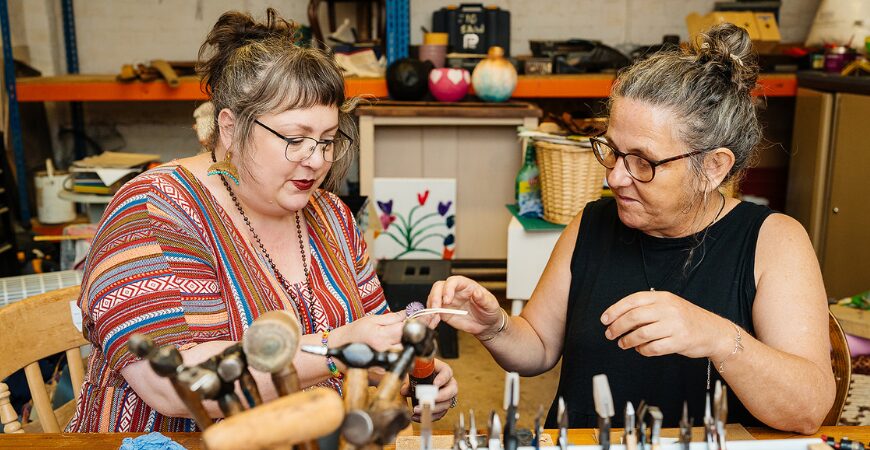Healing Trauma: Emmaus Norfolk & Waveney’s Pioneering Women’s Project
According to a study carried out by Fobbed Off, in 2021 60% of homeless adults living in temporary accommodation in England were women.
Women experiencing homelessness often struggle to get access to traditional support services due to a lack of understanding of their specific, gender-related needs, such as female-only spaces in order to feel safe. Recognising this gap, the British group Emmaus Norfolk & Waveney launched an innovative pilot project in January 2025.
We interviewed Cecile Roberts, CEO of Emmaus Norfolk & Waveney, about this transformative initiative.
What motivated this project?
When I joined Emmaus seven and half years ago, I noticed that there were no women in the community. Many Emmaus communities in the United Kingdom are in the same boat. The findings were clear: many women who have experienced a period of homelessness have also been victims of sexual violence and feel vulnerable around men. In 2020, we opened a wing reserved for women in our main building, consisting of three rooms. In only three months, it was already completely full.
Trends started to emerge very quickly: four out of five women had been victims of rape, all had been victims of domestic violence, with recurring patterns of coercive control. Emmaus UK asked me to design a project to specifically address these issues. With support from Emmaus UK, we developed a therapeutic programme, aimed at supporting women to make healthy choices in life and take steps towards a life that is authentic, secure and fulfilling.
We acquired additional buildings on our site – separate houses that could provide a safe, dedicated space for the programme. The response was overwhelming: we received around 200 applications for just nine places, which showed us the enormous need for this type of support.
How is the programme structured?
We launched the programme in January 2025 to support nine women in a house with en-suite facilities. Two therapeutic practitioners work with them two days a week throughout the year. The programme includes an eight-week domestic abuse course in April, followed by an eight-week sexual violence course in September, with rehabilitation support throughout.
Women also participate in creative activities – blacksmithing, textile work, and printmaking. We deliberately chose activities that challenge gender stereotypes. I wanted women working in our blacksmith’s forge with hammers and fire, not just traditional crafts. The textile work has been extraordinary – lino printing, embroidery, beautiful creations. This October, we opened a dedicated women’s shop showcasing their work. Women also work in the main community’s social enterprises.
These activities provide more than skills; they offer opportunities for reflection, peer support, and tangible achievements. Along with the therapy, it provides holistic support.
“The project has helped me keep safe and held me during a really bad time. [I felt] Not alone, and supported. Made a huge difference to me.” shares one of the women from the project in mid-point survey.
The project is designed with a participatory approach, how did women help shape the services offered?
Women complete regular anonymous surveys processed by our external evaluation partner. They reflect on the courses, therapy, resettlement support, and facilities. We’re also consulting the wider community about the project’s impact.
This feedback has been invaluable for shaping next year’s programme. For instance, we learn that it would be much more relevant to start all together in January rather than staggered entries, or have less time between the two courses, and a more challenging sexual violence course with more opportunity to discuss personal experiences.
Will the project continue?
Absolutely. We’ll fund it ourselves from January onwards. Applications are already open, and we have only a few spaces left. Some women from the current cohort will join the main Emmaus community; others are preparing to move into independent housing and we are providing appropriate support to help them plan this next step.
Moreover, the project has revealed something crucial about our wider work. Men in our community also need therapeutic support. We’re opening a five-bedroom therapeutic house for men in February 2026, focusing on communication, anger management, relationships, self-esteem, and managing addictions.
We’ve realised that in a male-majority community, Emmaus creates a safe bubble where the issues, traumas, or addictions men arrived with are held in suspension rather than being actively addressed. Without this therapeutic work, it becomes difficult for them to thrive outside the community without facing loneliness and isolation.
As Emmaus, we need to do more than simply welcome people; we must equip them for life beyond the community. This new therapeutic programme will help men work through their traumas whilst preparing them for independence through tailored training, work experience, and qualifications.
What’s your vision for the future?
I’d love to connect with other Emmaus women’s communities globally to share practice and build connections. It’s such a manageable project for fostering international links -nine women connecting with women elsewhere could really strengthen our movement.
The project has shown what’s possible when you embed therapeutic practice into your work. It’s transformed not just the participants’ lives, but our entire community’s understanding of how we can better support everyone experiencing homelessness.
Interested in learning more about this project or connect with Emmaus Norfolk & Waveney? Please contact Eve Poulteau, who will introduce you to the right person: eve [dot] poulteau [at] emmaus-europe [dot] org
—
The renovation of the buildings that house the therapeutic programmes for women and men was made possible thanks to funding from the Foundation for Housing and support from Emmaus International.

© Emmaüs Norfolk & Waveney



